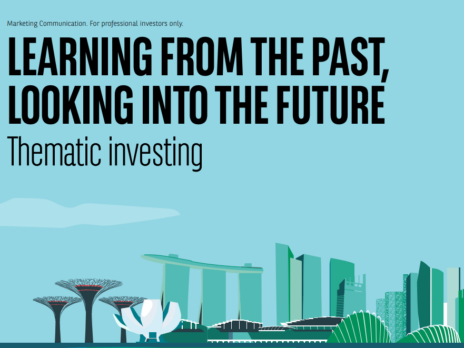
The clue to what “thematic investing” is lies in its name: it’s a reference to strategies that focus on a specific investment theme. And one of the main areas of focus for investors today is sustainability. But how does this approach differ from the more recognisable environmental, social and governance (ESG) investment standard?
ESG investing is the consideration of how environmental, social and governance practices influence the investment decision-making process. ESG can help investors gain a better understanding of the companies in which they invest. Thematic investment should be seen as a complementary tool to already established ESG frameworks.
There is a key difference between the two. With thematic investment, “you’re not [just] doing sector-based investing”, says Edward Lees, co-head of the Environmental Strategies Group at BNP Paribas Asset Management. “Instead, you’re investing in some sort of commerce [and] dynamics that cuts across sectors”.
Those dynamics and themes are wide-ranging. But investment topics relating to the environment and sustainability are perhaps gaining most ground at present, gathering attention from both the private sector and governments. Within the environmental brief, projects related to decarbonisation, decentralisation and digitalisation of energy systems, sustainable food production and clean water supply chains are among the most popular to invest in, according to Lees.

How do these investments, often across broad areas involving many sectors and stakeholders, work? Investors buy into the “story” of their chosen theme and dynamic, says Lees. That means looking at the end goal of a theme – the creation of sustainable foods, for example – and investing in the companies involved in developing the means to get there.
[See also: Seven ways to make leaders act on climate change]
A lot of thematic investing, particularly those strategies focused on environmental issues, will get increasing attention over the coming decades from governments and the private sector. That puts early adopters in a position to benefit from long-term growth, especially as more resources are poured into affected sectors.
“Why does one invest in a theme – what is its allure?” asks Lees. “It’s because one sees a pressing need for society where one sees a structural growth opportunity.” He continues: “There’s an economic growth engine there. We really think a theme that could be very strong for the next 20 years is hydrogen, because many governments around the world are mandating its build-out and subsidising it.”
Interest surrounding thematic investing has grown markedly in recent years. According to Morningstar, the financial services firm, assets under management in thematic funds had more than tripled to $595bn the three years to 2021.
This has garnered various myths about thematic investing, including the misconception that there’s a “trade-off” between environmental investing and long-term performance. People also wrongly believe that sustainable thematic investing is not diverse enough to make capital work across various industries. These notions are all generally exaggerated, and are not really challenges at all for investors, as Lees and Ulrik Fugmann, the co-head of BNP Paribas Asset Management’s Environmental Strategies Group, have outlined in an extensive briefing to investors.
In sustainable thematic reporting and investing, the Environmental Strategies Group tries to qualify the numbers for a specific company. “Here’s the beautiful thing,” says Lees, outlining the processes involved in analysing and deciding a company’s investment credentials. “You don’t need to calculate all the numbers upfront. All you need to do is say: ‘I can identify where there is scope for sustainability.’ You can’t make an exact calculation because it’s complicated, but you know that it is there. And therefore, an investor can use those principles to steer their investment. That’s exactly what sustainable thematic investing is about.”
Sustainable thematic investing can be as simple as that. It’s about finding those areas where we know there is some good being done, because the companies in question are solving a problem. It’s about investing in firms whose products and services are making a difference – whether it’s solar or wind or batteries, electric vehicles or hydrogen fuel cells – in respect to the environment. It might be too early in their journey to accurately calculate the benefits they are reaping, but we know they are moving in the right direction.
[See also: How to make your business indispensable in the green economy]



